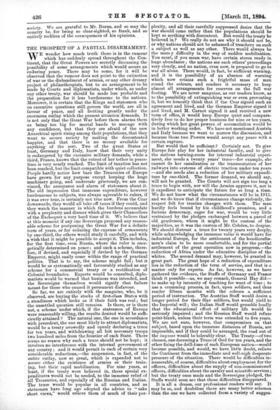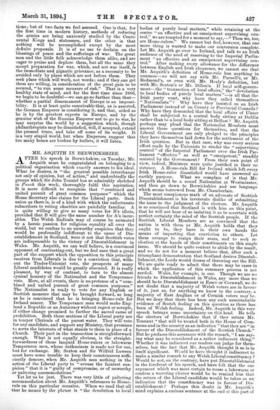THE PROSPECT OF A PARTIAL DISARMAMENT W E wonder how much
truth there is in the rumour which has suddenly spread throughout the Con- tinent, that the Great Powers are secretly discussing the possibility of some arrangements which would secure an enduring peace. There may be some, for it will be observed that the rumour does not point to the extinction of war or the disbandment of armies, or any other dreamy project of philanthropists, but to an arrangement to be made by Courts and diplomatists, under which, as under any other treaty, war should be made less probable and the preparation for it less burdensome to the nations. Moreover, it is certain that the Kings and statesmen who on executive questions still govern the world, are all in favour of peace, and all fretting greatly under the enormous outlay which the present situation demands. It is not only that the Great War before them alarms them as being too big for mortal hands to manage with any confidence, but that they are afraid of the new Anarchical spirit rising among their populations, that they want to secure society by making the discontented happier, and that there is no money available for anything of the sort. Two of the great States at least, Germany and Italy, know that their very unity is endangered by the excessive military demands, while a third, France, knows that the extent of her tether in peace- time is very nearly reached. The limit of taxation has not been reached, but the limit compatible with quiet collection. People hardly notice how bare the Treasuries of Europe have grown for any purpose except keeping the huge machinery going, and underrate grievously, we are con- vinced, the annoyance and alarm of statesmen about it. The, old impression that immense expenditure, however burdensome to subjects, was always agreeable to rulers, if it was ever true, is certainly not true now. From the Czar downwards, they would all take off taxes if they could, and they watch the manner in which the burdens accumulate with a perplexity and dismay which gives their Chancellors of the Exchequer a very hard time of it. We believe that at this moment if any one Sovereign proposed any reason- able scheme for postponing the Great War for a definite term of years, or for reducing the expense of armaments by one-third, the others would study it carefully, and with a wish that it might be possible to accept it. This includes, for the first time, even Russia, where the ruler is ener- getically determined on peace ; and such a scheme, there- fore, if devised, and especially if devised by the German Emperor, might easily come within the range of practical politics. That is to say, the scheme might fail; but it would be as systematically and favourably studied as any scheme for, a commercial treaty or a rectification of Colonial boundaries. Experts would be consulted, diplo- matists would be warned that business was intended, and the Sovereigns themselves would signify that failure meant for those who caused it permanent disfavour. So far, we are entirely with the sanguine, who, be it observed, are buying the stocks of first-class States with a steadiness which looks as if their faith was real ; but the unsettled question still remains. Is there, or is there not, a scheme under which, if the statesmen of Europe were reasonably willing, the results desired would be suffi- ciently attained ? The natural one, the one in accordance with precedent, the one most likely to attract diplomatists, would be a treaty avowedly and openly declaring a truce for ten years, and withdrawing all but necessary troops two hundred miles from the frontier of each State. There seems no reason why such a truce should not be kept ; it involves no interference with the internal government of any country ; and it would permit in each of certain very considerable reductions,—the suspension, in fact, of the entire outlay, now so great, which is expended not to secure either the existence of armies or their train- `_ leg, but their rapid mobilisation. For nine years, at least, if the treaty were believed in, those special ex- penditures would not be needed, to the immense relief of all Treasuries, and especially of the Russian and Italian. The truce would be popular in all countries, and as statesmen have long ago adopted. the advice to " take short views," would relieve them of much of their per- plexity, and all their carefully suppressed desire that the war should come rather than the populations should be kept so seething with discontent. But would the treaty be believed in ? We really do not see why it should not be, or why nations should not be ashamed of treachery on such a subject as well as any other. There would always be the money difficulty in the way of sudden mobilisation. You must, if you mean war, have certain stores ready in huge abundance ; the nations see each others' proceedings very clearly, and no nation, even now, is prepared to go to war all alone. There would, in fact, be sufficient warning, and it is the possibility of an absence of warning which now retains such a frightful mass of men round the colours, and renders it necessary to keep almost all arrangements for reserves on the full war footing. We are never sanguine, as our readers know, as to the possibility of extinguishing war or even preventing it, but we honestly think that if the Czar signed such an agreement and lived, and the German Emperor signed it and lived, and M. Carnot signed it and received a new term of office, it would keep Europe quiet and compara- tively free to do her proper business for nine or ten years, during which her great powers of accumulation would be in better working Order. We have not mentioned Austria and Italy because we want to narrow the discussion, and because those two Powers would accept any peace with a certain rapture. But would that be sufficient ? Certainly not. To give Europe fair play for her industrial faculty, and to give the nations turning-room for internal industrial experi- ment, she needs a twenty years' truce—for example, she cannot do her canalisation or the transmutation of her railways into systems of electric traction under ten years —and she needs also a reduction of her military expendi- ture by one-third. The former demand, we should say, will not be granted. The Courts will not sign too long a truce to begin with, nor will the Armies approve it, nor is it expedient to anticipate the future for so long a time. We do not know what the circumstances will be in 1915. and we do know that if circumstances change violently, the respect felt for treaties changes with them. The man hardly feels bound by his childhood's promises, and a furious democracy, eager for war, would be very little restrained by the pledges exchanged between a parcel of old gentlemen, whom it might be the custom of the majorities, as it was the custom of Mr. Cobden, to despise. We should distrust a truce for twenty years very deeply, while acknowledging the immense value it would have for industrial Europe, for the settlement of the handicrafts- men's claim to be more comfortable, and for the partial settlement of the great operation now in progress,—the reduction of Africa under the educative discipline of the whites. The second demand may, however, be granted in great part. The great hope of a reduction of expenditure lies in the reduction of the term of service, and that is a matter only for experts. As far, however, as we have gathered the evidence, the Staffs of Germany and France think it possible—as, we may remark, General Hay did— to make up by intensity of teaching for want of time ; to use a cramming process, in fact, upon soldiers, and thus render fifteen months with the colours a sufficient period of instruction. The Austrian Staff would desire a longer period for their Slav soldiers, but would yield to the Imperial will ; the Italian Staff would grumble loudly that the educational effect of military life would be seriously impaired ; and the Russian Staff would refuse point-blank, unless their term was extended to five years. We are not sure, however, that compromises on that subject, based upon the immense distances of Russia, are impossible, and if they could be arranged, the road out of the impasse would be tolerably clear. The Treaty—of two clauses, one decreeing a Truce of God for ten years, and the other fixing the drill-time of each European nation—would become possible, and would, we have little doubt, relieve the Continent from the immediate and well-nigh desperate pressure of the situation. There would be difficulties in- numerable, of course, difficulties about employment for the officers, difficulties about the supply of non-commissioned officers, difficulties about the cavalry and scientific services ; but the treaty once made and the Sovereigns pledged, the Staffs would soon see that those difficulties disappeared.
It is all a dream, our professional readers will say. It may be so, and doubtless there are many better schemes than the one we have collected from a variety of sugges- tions ; but of two facts we feel assured. One is that, for the first time in modern history, methods of reducing the armies are being anxiously studied by the Conti- nental Kings and statesmen, and the other is that nothing will be accomplished except by the most definite proposals. It is of no use to declaim on the blessings of peace and the sufferings of war. The great men and the little folk acknowledge them alike, and are eager to praise and deplore them, but all the same they accept preparation for war, which, and not war itself, is the immediate and gigantic grievance, as a necessity to be avoided only by plans which are not before them. They seek plans which will work, not words ; and if they can get them are willing, in consideration of the great gain to be secured, " to run some measure of risk." That is a very healthy state of mind, and for the first time since 1866, we begin to be doubtful—we can go no farther than that— whether a partial disarmament of Europe is an impossi- bility. It is at least quite conceivable that, as is asserted, the German Emperor is considering it, and that, aided as he is by the greatest experts in Europe, and by the genuine wish of the Russian Emperor not to go to war, he may surprise the world by a suggestion which, though philanthropists may be dissatisfied, will, if accepted, extend the present truce, and take off some of its weight. It is a very stupid world, but when Emperors suggest that too many bones are broken by bullets, it will listen.



































 Previous page
Previous page